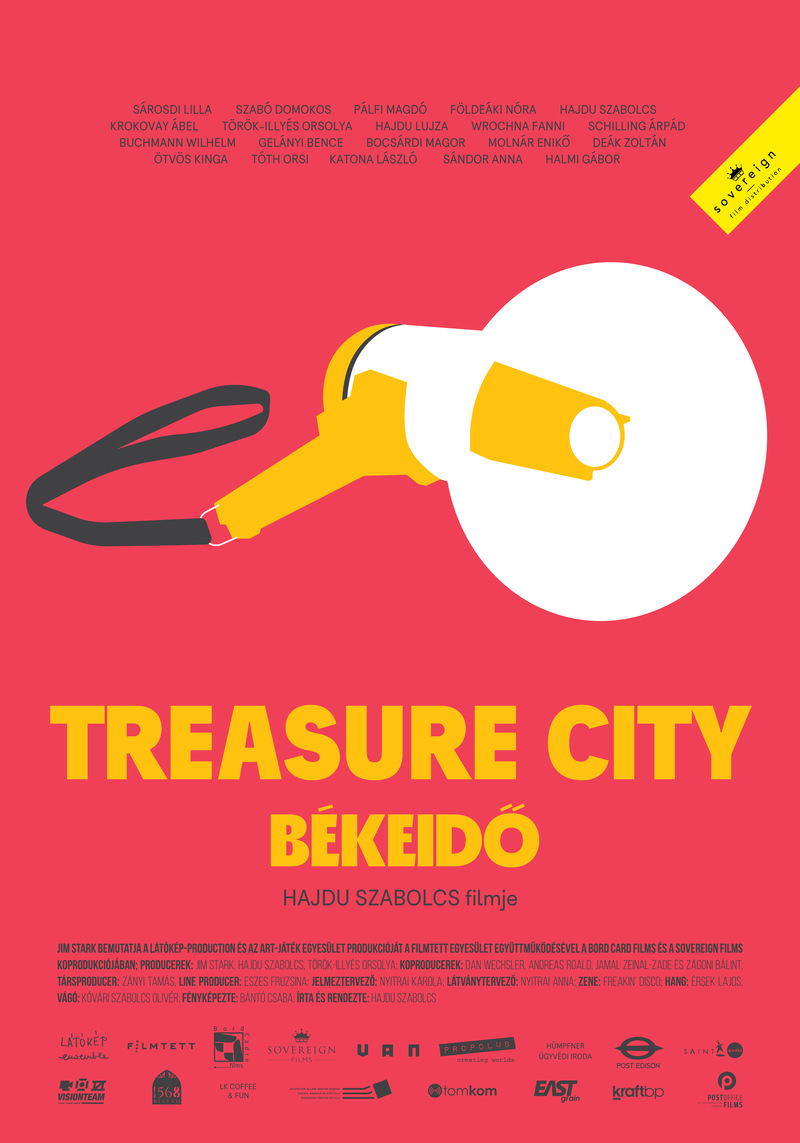
Review by
Eric Hillis
Directed by: Szabolcs Hajdu
Starring: Árpád Schilling, Domokos Szabó, Fanni Wrochna, Lilla
Sárosdi, Lujza Hajdu, Magdó Pálfi, Nóra Földeáki, Orsolya Török-Illyés,
Szabolcs Hajdu, Wilhelm Buchmann

Hungarian writer/director Szabolcs Hajdu opens his ensemble drama
Treasure City with a quote from Thomas Bernhard, which reads
"As if just then everything was possible: the ugly approaches the
beautiful, and vice versa, the ruthless and the weak."
His film is populated by the ruthless and the weak, though it's not always
clear which category each particular character falls into.
With Treasure City, Hajdu portrays Orban-era Hungary as a deeply divided nation. State
radio broadcasts constantly relay scare stories about crimes committed by
immigrants in liberal European countries like Sweden and Germany.
Passersby scream at opposition protesters, accusing them of being
communists. A store clerk treats a migrant customer with disdain,
provoking an in-store row.

The divisions aren't just political, but also seem to be tearing apart
relationships. A pastor (played by the director and looking a lot like
The Simpsons' Ned Flanders) and his wife constantly bicker over how to raise their
insolent son, who is going through a punk rock phase, sporting an
elaborate Mohawk and refusing to eat his greens. An actor's failure to
remember an anniversary leads his wife to reveal an incident of infidelity
involving an underage boy.
Elsewhere there are odd moments of connection. A long-haired hippy bonds
with a taciturn hitch-hiker. A dolled-up teenage girl has her palm read by
a pretentious train passenger before a rendezvous with the aforementioned
punk.

With its series of eventually overlapping vignettes,
Treasure City has something of the feel of a Roy Andersson
film, but formally the Swede and the Hungarian are poles apart. Both
employ unbroken long takes that allow us to soak up individual scenes, but
where Andersson sets up immaculately framed, locked down shots, Hajdu's
camera is constantly floating around his subjects, as though attached to a
goldfish in some human aquarium. Some of the shots appear to play around
with time, advancing several seconds or minutes or perhaps even hours in
the space of a camera pan. In the manner of Nuri Bilge Ceylan,
conversations and arguments ramble on and evolve to the point where both
the participants and the audience forget what the initial intent was.
Some of the storylines lead to tragedy, some to hopefulness, while some
simply dissolve into the night. They have the feel of some newly unearthed
stories by Raymond Carver, the author whose work provided the basis for
Robert Altman's similarly constructed Short Cuts. With its nocturnal setting, the film resembles a dark cousin to Jim
Jarmusch's Night on Earth. As dark as it gets, it offers some wry moments of comedy, like how the
punk is forced to keep his head tilted while in his father's car so as not
to ruin his Mohawk, or a woman's delight at being treated well by a waiter
after a row with an ignorant florist. Said waiter staffs a curiously quiet
hotel bar that wouldn't be out of place in Twin Peaks, and it almost feels like some half-lit waiting room in purgatory.

Treasure City begs repeat viewings to soak up details you
might have missed, and I suspect it may be more rewarding on a rewatch
with a familiarity with its characters. I've only watched it once, and I
found it thoroughly intoxicating, one of those all too rare films that
keep you entranced, blissfully ignorant of what might happen next. I
certainly couldn't have predicted the final scene, which springs a magical
surprise that feels like a nod to Tarkovsky.
Hungary may be in a sorry state as a society, but
Treasure City is the latest of many recent movies that prove
the Eastern-European nation boasts one of the continent's most exciting
film industries.

Treasure City is in UK cinemas and
on VOD from June 18th.

